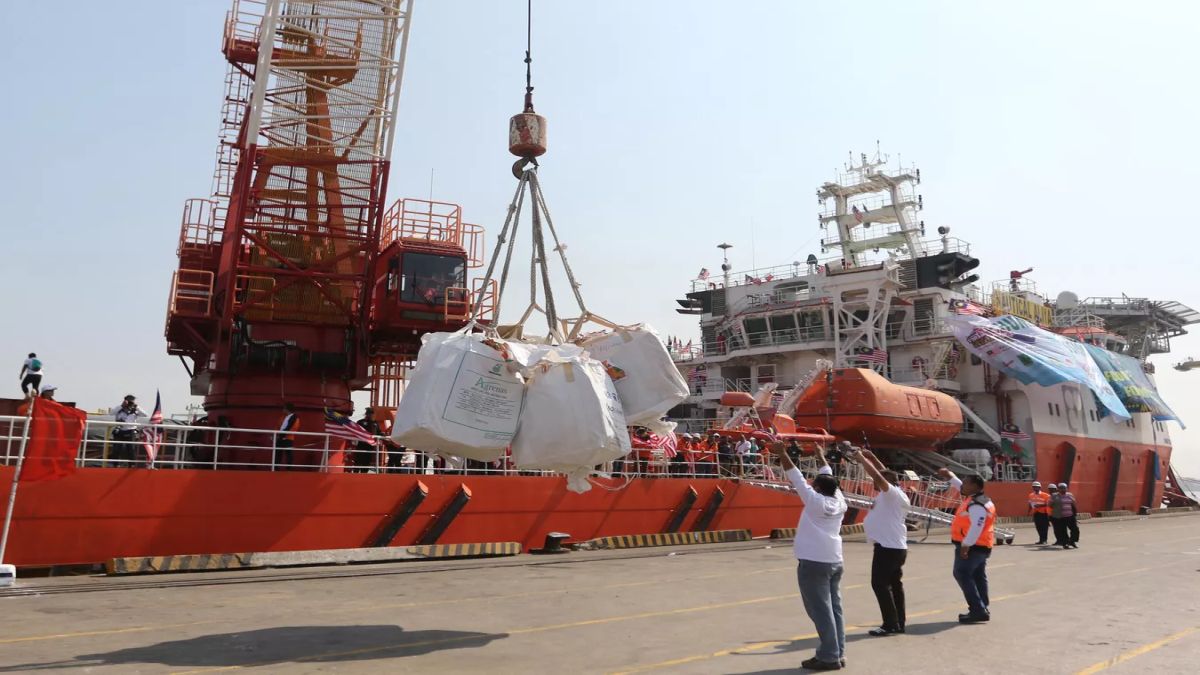Pakistan and Bangladesh have traditionally not shared friendly relations. However, late last week, on Wednesday (November 13), a cargo vessel from Karachi docked at Bangladesh’s southeastern coast, marking the first-ever direct maritime contact between the two countries since the 1971 Bangladesh Liberation War.
This move marks a historic shift in the complex Pakistan-Bangladesh relationship, signalling a warming of ties under the new interim government led by Muhammad Yunus, who has now completed 100 days in power.
The move also has implications for India, especially its security, which shares a huge border with Bangladesh.
Docking of ship at Bangladesh’s Chittagong
Last Wednesday, the ship , ‘MV Yuan Xian Fa Zhong’, arrived at the port in Bangladesh and left soon after unloading the cargo from Pakistan. According to port authorities, the 182-metre-long vessel brought goods from Pakistan and the United Arab Emirates, including raw materials for Bangladesh’s key garment industry and basic food items.
According to a report by the Dhaka Tribune, the largest shipment was sodium carbonate (soda ash), used in industries like textiles, which was brought in 115 containers.
Previously, containers from Pakistan had to pass through a third country before reaching Bangladesh.
Later, Pakistan’s high commissioner Syed Ahmed Maroof said that the direct shipping route was “a major step” in boosting trade across the region. “The initiative will accelerate existing trade flows and promote new opportunities for businesses on both sides, from small traders to large exporters.”
This direct shipment comes after the Muhammad Yunus -led interim government in Dhaka eased import restrictions on Pakistani goods. Earlier, such goods required a mandatory physical inspection on arrival resulting in long delays.
At the time, the Nobel laureate said, “The maritime link is essential for reviving our relations.” He also called for a “new page” in Pakistan-Bangladesh ties to enhance cooperation in different sectors.
Pakistan-Bangladesh ties deepen
The docking of the ship from Pakistan in Bangladesh is a significant shift in Dhaka-Islamabad ties. The two countries — once one nation — split in 1971 following the Liberation War . The memory of the brutal war, which saw the killing of millions remained deeply imprinted in Bangladesh’s national psyche until recently.
Under Sheikh Hasina ’s tenure, Bangladesh continued to keep Pakistan at bay. On the other hand, she kept bringing Bangladesh closer to India. For instance, in August 2022, her government denied permission to a newly commissioned Chinese-built frigate warship PNS Taimur to dock at Chittagong Port. The warship finally docked at a port in Sri Lanka following its maiden voyage following exercises with Cambodian and Malaysian navies.
However, since
Hasina’s ouster — she fled Dhaka in August — the Muhammad Yunus-led government has taken an alternate route, deepening ties with Pakistan.
Besides the direct shipping route, there are other signs of the two countries coming closer together. On September 11, the 76th death anniversary of Pakistan founder Muhammad Ali Jinnah was observed at the National Press Club in Dhaka ironically with Urdu poetry. Reports said that participants at the event praised Jinnah, with one even saying, “Jinnah is the father of our nation” and without Pakistan, “Bangladesh would not exist” today.
Since Hasina’s ouster, the visa process between the two countries has also simplified. In September, Islamabad announced that Bangladeshis could travel to the country without a visa fee.
Bangladesh also ordered for fresh supply of artillery ammunition from Pakistan. The order included 40,000 rounds of ammunition, 40 tonnes of RDX in wax consistency for explosives and projectiles of high intensity, 2,900 in number. While this isn’t the first such order, officials in New Delhi have pointed out that the numbers were far greater than usual. The earlier order in 2023 was for 12,000 rounds of ammunition.
A video featuring Dr Shahiduzzaman, a professor of international relations at Dhaka University, also went viral, as he advocated for a nuclear treaty with Pakistan as a safeguard against India.
Implications for India
A deepening of ties between Dhaka and Islamabad is a concern for India, the neighbouring country.
But why?
Experts opine that Bangladesh scrapping the mandatory physical inspection could facilitate the movement of illegal weapons and narcotics.
As a former diplomat explained that India would only be worried if Pakistan was sending “anything objectionable”. “You can look at it in a normal way that it is just a trading ship except for the fact that the Bangladesh government has erased the mandatory checking,” he was quoted as telling South China Morning Post. “And Pakistan has a habit of sending arms and ammunition to various groups in Bangladesh, that is the main issue.”
Michael Kugelman, director of the Wilson Center’s South Asia Institute, told This Week in Asia that India was bound to be concerned about the growing ties between the two. He referred to the 2004 incident where a shipment of arms meant for terrorist outfit ULFA (United Liberation Front of Asom) in India was intercepted at Bangladesh’s Chittagong.
At the time, India alleged that Pakistan had sponsored this shipment. “Given India’s fraught relationship with Pakistan and given Delhi’s suspicion about any type of Pakistan’s intention in Bangladesh, I think for India this development [docking of Pakistan vessel] will be viewed with [a] considerable amount of concern,” said Kugelman.
Bangladesh Speaks
Meanwhile, Muhammad Yunus has emphasised the importance of Dhaka and Delhi maintaining “very close” relations. “Relations between the two countries must be very close. There can be no alternative to this. They need this, we need this,” he was quoted as saying by Bangladeshi daily Prothom Alo. “This is essential from any angle, whether it’s about economics, security or water,” he added.
When asked about the recent tensions between the two countries, Yunus said the recent incidents in Bangladesh might have “disheartened” India and “they were not pleased with the changes.”
With inputs from agencies


)

)
)
)
)
)
)
)
)



